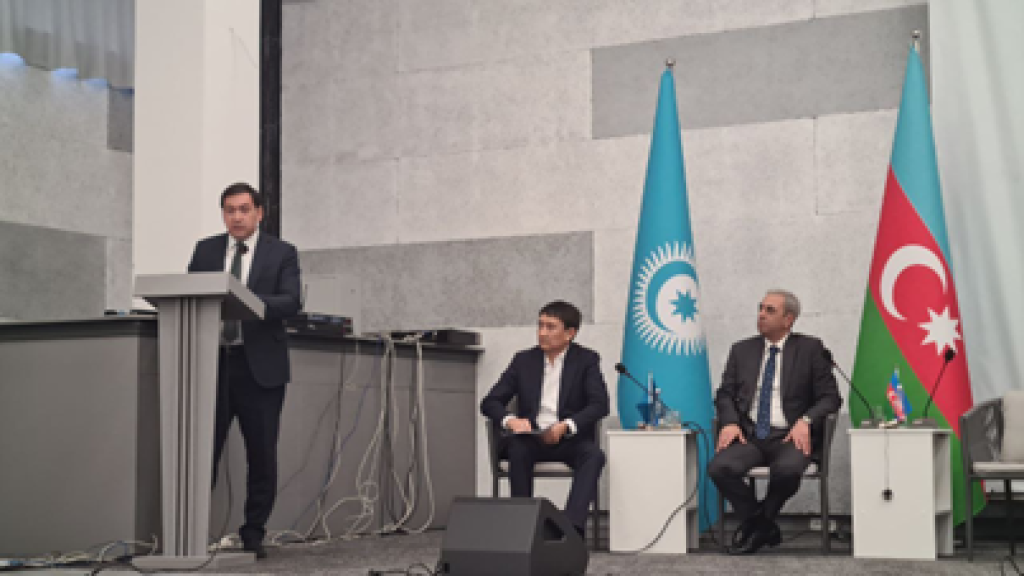WNAM REPORT: This was stated by Deputy Director of the Institute for Strategic and Regional Studies under the President of the Republic of Uzbekistan (ISRS) Bakhtiyor Mustafayev during the 10th meeting of official research centers on the foreign policy of the member countries and observers of the Organization of Turkic States (OTS) held on September 26 in Cholpon-Ata on “The Turkic World – One World”.
As the expert noted, the OTS has already become an influential international structure that promotes the development of practical partnership in all priority areas.
In this context, B. Mustafayev paid particular attention to the positive dynamics of economic indicators. Thus, today, the total GDP of the OTS states is 1.6 trillion dollars, and by the end of 2024, as expected, the volume of the economy of the Turkic countries will reach $1.9 trillion, and the population is 178 million people.
Against this background, according to the ISRS Deputy Director, foreign investors’ interest in the OTS space is growing. In 2023, the volume of foreign direct investment in the economies of the OTS states reached $50 billion, 1.5 times more than in 2017 (about $30 billion). Over the past five years, the number of joint ventures with foreign capital has increased from 53 thousand to 92 thousand units.
In 2023, trade turnover between the Organization’s countries increased by 27% compared to 2022, reaching $42 billion. Tourist exchanges and mutual investments are growing. As a result, he emphasized that the organization is strengthening its position today as a dynamically developing space for new economic opportunities.
At the same time, the ISRS representative is convinced that industrial cooperation is considered a promising area. According to the UN, interstate collaboration in this area reduces the time for production preparation by 14-20 months and reduces costs by 50-70% compared to independent organization.
Today, the OTS has created all the necessary conditions for increasing cooperation in the above-mentioned direction.
First, he noted, the legal and institutional framework is being strengthened. In particular, the Development Strategy of the Turkic World until 2040 identifies the development of industrial cooperation between the OTS countries as a priority area. The Turkic Chamber of Commerce and Industry, whose activities aim to strengthen collaboration among entrepreneurs, is functioning effectively.
Applications for implementing joint projects within the Turkic Investment Fund are planned to be accepted starting on November 1 this year. Of course, the upcoming first meeting of the Ministers of Science, Technology, Innovation and Industry, planned to be held at the end of September this year in Istanbul, will give new impetus to developing industrial cooperation within the OTS.
Second, according to B. Mustafayev, the geographical location of the OTS countries allows them to become a key link in international trade and new global supply chains. Participation in economic associations and a strategic position open up opportunities for entering the markets of third countries. Kazakhstan and Kyrgyzstan are members of the EAEU, Uzbekistan has the infrastructure for cooperation with South Asia, Azerbaijan has ports on the Caspian Sea, and Hungary is a member of the EU. Türkiye, although not a member of the EU, has been part of the European Union Customs Union since 1995.
Third, the expert noted, there are already successful examples of industrial cooperation between the OTS countries. For instance, UzAuto Motors and partners from Kazakhstan, Kyrgyzstan, and Azerbaijan have created several enterprises to produce Chevrolet cars. Uzbek textile companies sew clothes for Turkish brands such as LC Waikiki and DeFacto. Soon, the Uzbek company Global Textile plans to build a textile cluster in Azerbaijan, covering the entire production cycle from cotton cultivation to the release of finished products.
To further develop industrial cooperation, based on the proposals put forward by the President of Uzbekistan, the expert called for the adoption of the following measures:
First is the development of the credit and financial institutions system. Creating the Development Bank of the OTS is particularly important in this context.
Second, the formation of primary production assets and technologies, modernization and automation of equipment, and the introduction of modern scientific and technological progress.
Third, accelerating the launch of the Research Center for Trade Cooperation of the OTS, whose activities will be aimed at developing practical proposals to create favorable conditions for expanding economic ties.
In general, as B. Mustafayev concluded, industrial cooperation is a key factor in the economic cooperation of the OTS countries, contributing not only to strengthening mutual ties and the exchange of technologies, but also to the creation of sustainable conditions for joint growth and development, which will ultimately allow the regions to increase their competitiveness in the global arena.
The event, organized by the National Institute for Strategic Initiatives under the President of the Kyrgyz Republic, was attended by prominent representatives of leading think tanks from Azerbaijan, Kazakhstan, Kyrgyzstan, Uzbekistan, Türkiye, Hungary, the OTS and the ECO.
The meeting participants discussed the prospects for developing multifaceted cooperation within the OTS in the political, economic, scientific, innovative, cultural, and humanitarian spheres.


